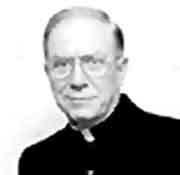 | Father Richard James Cleary was born and reared in Wichita. After graduation from Cathedral High School in 1947, he attended the seminary operated by the Benedictine monks of Conception Abbey in Northwestern Missouri. There he came to appreciate the life of the monks and, having obtained the permission of Bishop Mark Carroll of Wichita, he became a monk of that monastery. After being ordained a priest in 1955, his superiors sent him to get his master’s degree at the University of Ottawa, Canada, then to study in Athens, Greece, and then in Rome, Italy, where he obtained his doctor’s degree in Theology. Finally, he spent a year of study at Harvard University. Later, Fr. Cleary was assigned to teach for many years in Rome. In 1998, he returned to Wichita, where he served in parish ministry at St. Mary’s Cathedral and at Blessed Sacrament parishes. In 2001, his abbot (superior) transferred him to Arkansas, where he served as chaplain of the Benedictine Sisters of Holy Angels Convent in Jonesboro, and helped in the parishes of northeast Arkansas. In March 2010, he was re-assigned to his monastery, Conception Abbey, Conception, in Missouri 64433. He can be contacted there at, 660-944-2877, or by email: rjcleary@juno.com. |
Religion
2006-03-01 10:52:00
Are good works necessary for salvation?
QUESTION: Are good deeds necessary for my savlation?
ANSWER: In his epistle in the New Testament St. James the Apostle, called “the brother of the Lord” (actually, he was Jesus’ cousin), takes up this very idea about the necessity of good works for salvation. In Chapter 2, Verses 14 and following, James wrote: “My brothers, what good is it for someone to say that he has faith, if his actions do not prove it? Can that faith save him? Suppose there are brothers and sisters who need clothes and don’t have enough to eat. What good is there in your saying to them: ‘God bless you! Keep warm and eat well!’ – if you don’t give them the necessities of life? So it is with your faith: if it is alone and includes no actions, then your faith is dead.The Apostle James continues: “But someone will say: ‘one person has faith, another deeds.’ My answer is: ‘Show me how anyone can have faith without deeds. I will show you my faith by my deeds.’ Do you believe that there is only one God? Good! The devils also believe, and they tremble with fear. You fool! In our father Abraham . . .his faith and actions worked together; his faith was made perfect through his deeds. . . . And so Abraham was called God’s friend. You see then, that it is by his deeds that a person is put right with God, and not by his faith alone. . . . Faith without deeds is dead.”At the time of Protestant Reformation, Martin Luther rejected this epistle, calling it “an epistle of straw,” precisely because of the above chapter, which contradicts Dr. Luther’s insistence on the necessity of faith alone as necessary for salvation. Luther was protesting against the Catholic Church’s practices of various devotions and good works, so that whoever did them were granted indulgences. These practices and works were expressions of their Catholic faith, which inspired them to undertake the devotions and good works. Granting that sometimes there were abuses in those matters, abuses do not invalidate the whole teaching about the necessity of good works as evidencing authentic faith. In time the Catholic Church corrected those abuses, and today we don’t hear much about indulgences. Still, the Church teaches, with St. James, that good works are evidence of real faith, which is necessary for salvation. Faith alone, as the Apostle points out, is insufficient for salvation, just as the devils believe, and they are in hell because they are lacking good deeds. No one before Luther (16th century) rejected this epistle. Happily today most Lutherans accept the epistle of James as an integral part of the New Testament. And most Lutherans practice good works as evidence of their genuine Christian faith.


